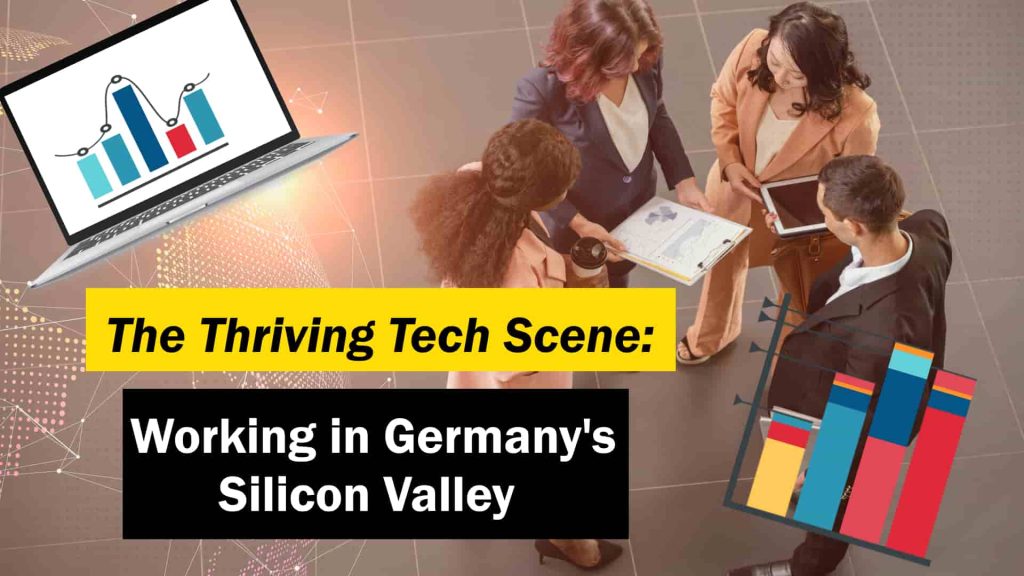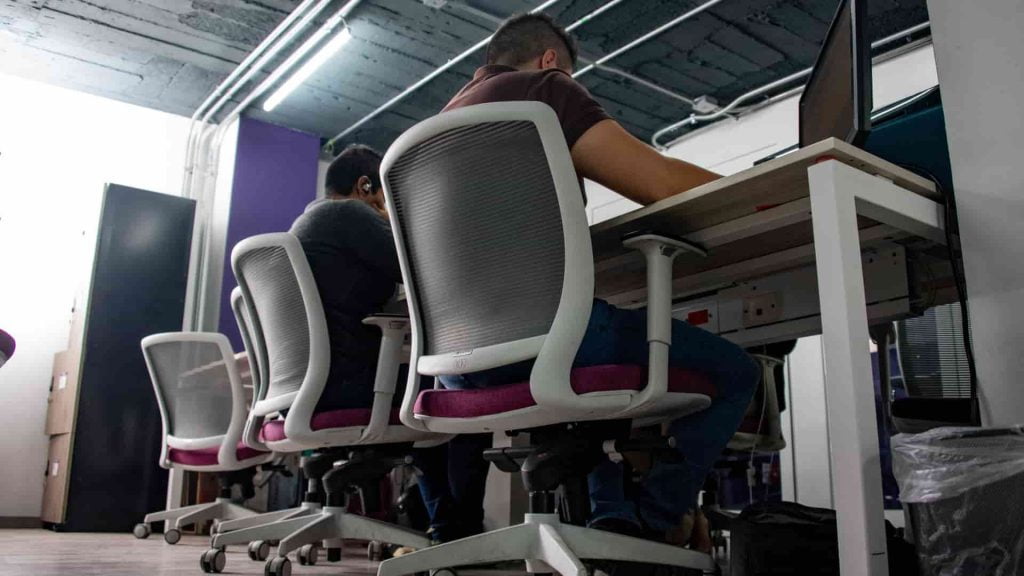
Know what is considered the heartbeat of innovation and the secret gem of Europe’s tech landscape? Germany’s Silicon Valley!
Often overshadowed by its Californian counterpart, Germany’s tech scene is bustling with creativity, efficiency, and groundbreaking advancements. In this vibrant ecosystem, startups and tech giants alike are forging the future. But what’s beneath the surface?
From the thriving startup culture in Berlin, which attracted over €3.1 billion in venture capital in 2020 alone, to Munich’s status as a world leader in automotive and manufacturing innovation, Germany is a kaleidoscope of tech opportunities.
We’ll dive into the unique work culture that blends precision with passion, reveal how cross-industry collaborations are redefining innovation, and explore the unspoken rules of navigating this high-tech world.
Top 5 Insider Secrets About Working in Germany
Here are our top 5 tips to make your position in Germany’s tech scene quite a breeze:
Secret #1: Berlin and Munich – The Tech Powerhouses
Both Berlin and Munich are literally tech powerhouses, with their millions of opportunities catering to seasoned workers in the industry, freshers who want to expand their network and freelancers ready to set the stage on fire.

Berlin: The Startup Haven
Berlin, a city synonymous with a vibrant culture and rich history, has emerged as a pivotal player in Europe’s startup scene. This city’s dynamic tech ecosystem is a fertile ground for innovation and entrepreneurship.
- Diverse Startup Landscape: Berlin’s startup scene is characterized by its diversity, with companies spanning a multitude of sectors including fintech, healthtech, and media.
- N26’s Success Story: N26, the mobile banking startup, is a prime example of Berlin’s prowess in fintech innovation. This digital bank has revolutionized the way people manage their finances, attracting millions of users worldwide.
- SoundCloud’s Global Impact: SoundCloud, originating from Berlin, has transformed the music industry. This online audio distribution platform has given artists a unique space to share their music, reaching audiences globally.
- Venture Capital Magnet: The city attracts significant venture capital, fueling the growth of startups. Berlin’s ecosystem provides the perfect blend of funding, talent, and a supportive community.
We think you’ll love this: What Did Renting My First Apartment in Germany Look Like
Munich: The Engineering and Automotive Leader
While Berlin shines in the startup sector, Munich stands tall as a leader in engineering and automotive innovations, home to global tech giants.
- Hub for Tech Giants: Munich hosts major players like Siemens and BMW, underlining its status as a tech leader.
- Siemens’ Innovation Footprint: Siemens, with its cutting-edge research in automation and digitalization, is driving technological advancements globally.
- BMW’s Automotive Excellence: BMW, headquartered in Munich, is at the forefront of automotive innovation, pushing the boundaries in luxury car manufacturing and electric vehicle development.
- Focus on Engineering Prowess: Munich’s emphasis on engineering and technology attracts top talent and investments, cementing its position as a powerhouse in high-tech engineering solutions.
Secret #2: A Culture Rooted in Collaboration and Creativity
German tech companies are renowned for cultivating a culture of collaboration, which is a cornerstone of their success. This collaborative spirit is evident in various facets of the workplace.
- SAP’s Team-Based Approach: SAP, a global software giant, exemplifies this collaborative ethos. By fostering team-based environments, SAP encourages diverse perspectives, leading to innovative solutions.
- Emphasis on Cross-Functional Teams: Many German tech firms prioritize cross-functional team structures, bringing together experts from various disciplines to solve complex problems.
- Partnerships and Joint Ventures: Collaboration extends beyond company walls. German tech companies often engage in partnerships and joint ventures, blending expertise to drive technological advancements.
- Open Communication Channels: Open communication is a key feature, promoting transparency and collective problem-solving, further strengthening the collaborative culture.

Also read: 5 Best German Castles to Keep an Eye Out For: From Königspalast to Neuschwanstein
Fostering Creativity Through Coworking Spaces and Hubs
Berlin, in particular, is a hub for creativity, greatly influenced by the city’s numerous coworking spaces and innovation centers.
- Coworking Spaces as Innovation Catalysts: Coworking spaces in Berlin, like Factory Berlin and Betahaus, provide creative environments for tech professionals to collaborate, network, and innovate.
- Community and Networking Events: These spaces frequently host events and workshops, fostering a community spirit and encouraging the exchange of ideas.
- Support for Startups and Freelancers: Coworking spaces are essential for startups and freelancers, offering flexible, resource-rich environments to grow and thrive.
- Innovation Hubs Sparking Creativity: Berlin’s innovation hubs serve as breeding grounds for new ideas, where tech companies and creative minds come together to explore futuristic technologies.
Secret #3: Pioneering the Habit of Work-Life Balance
Germany’s approach to work-life balance is not just a concept but a well-practiced ethos, deeply embedded in its work culture. This balance is significantly different from the often ‘always-on’ culture observed in Silicon Valley.
German legislation and company policies actively promote a healthy work-life balance. The country has strong labor laws that limit the number of working hours to an average of 48 hours per week, with many companies opting for even shorter workweeks. This framework ensures that employees have ample time for personal pursuits and family life.
Moreover, Germany mandates a minimum of 20 vacation days per year, with many companies offering more. This generous vacation policy is a testament to the value placed on rest and rejuvenation.
Don’t forget to read: The Free Education System in Germany: What, How, When, Where, and Why?
Consider the table below that highlights the difference between German and Silicon Valley culture:
| Aspect | Germany | Silicon Valley |
| Working Hours | Average of 35-40 hours/week | Often exceeds 40 hours/week |
| Vacation Days | Minimum 20 days, often more | Typically 10-15 days |
| Work Culture | Emphasis on efficiency during work hours | Culture of long hours and high availability |
| Employee Well-being | Strong focus on employee health and well-being | Often secondary to company growth |
Secret #4: Robust Government Support and Industry Collaboration
The German government plays a pivotal role in nurturing the tech ecosystem through various initiatives, ensuring that the country remains at the forefront of technological innovation.
- The Digital Hub Initiative: This initiative is a prime example of government support. Aimed at fostering digital innovation, the initiative establishes hubs across Germany, each specializing in different tech sectors. These hubs serve as a nexus for startups, established companies, and research institutions to collaborate and innovate.

- Funding and Grants: The German government provides substantial funding and grants to support tech research and development, particularly for startups and SMEs.
- Regulatory Support for Innovation: Germany is known for its forward-thinking regulatory environment, which encourages technological advancements while ensuring data protection and security.
- International Collaboration: The government also facilitates international partnerships, attracting global talent and investment, and promoting German tech innovation on a worldwide stage.
Academic and Industry Synergy with Fraunhofer-Gesellschaft
The collaboration between academia, industry, and government in Germany is exemplified by the Fraunhofer-Gesellschaft, one of the world’s leading applied research organizations.
The Fraunhofer-Gesellschaft’s research partnerships bridge the gap between scientific discovery and commercial application. Collaborating closely with universities and industry leaders, they focus on developing practical solutions to improve both the private sector and public life.
Their projects range from advancing sustainable energy solutions to pioneering new medical technologies. This synergy ensures that scientific advancements are rapidly transformed into market-ready products and services, fueling innovation and economic growth.
The Fraunhofer model has become a global benchmark for successful industry-academia collaboration, showcasing the effectiveness of combined efforts in driving technological progress.

Your recommended post for the week: 15 Things Nobody Tells You About Working in Germany
Secret #5: Embracing International Talent and Diversity
Germany’s tech scene is distinctly international, drawing talent from across the globe. This diversity is a driving force behind its innovative strength.
International Composition of the Tech Workforce
The cosmopolitan nature of Germany’s tech workforce is especially evident in its major cities. For instance:
| City | Percentage of Foreign Nationals |
| Frankfurt | Approximately 28% |
| Berlin | Around 19% |
| Munich | Nearly 23% |
Diversity Initiatives in German Tech Companies
German tech companies actively promote diversity through various initiatives:
- Women in Tech Events: Many companies host and participate in Women in Tech events, aimed at supporting and encouraging female participation in the tech industry.
- Inclusion Programs: Inclusion programs are widespread, focusing on creating an inclusive environment for all employees, regardless of their background.
- Cultural Sensitivity Training: These companies often offer cultural sensitivity training to ensure a respectful and understanding workplace.
- Recruitment Strategies: Recruitment strategies are increasingly focused on attracting a diverse range of candidates, recognizing the value of different perspectives in driving innovation.
Make sure to read: Thriving in a New Career Abroad: My Story of Working in Germany

The hidden tech scene and working in Germany is a mosaic of innovation, collaboration, and diversity.
From Berlin’s vibrant startup culture to Munich’s engineering excellence, Germany stands as Europe’s Silicon Valley, distinguished by its unique blend of creativity and precision. The country’s approach to work-life balance, bolstered by supportive government policies and a culture of collaboration, sets a global standard.
As we’ve explored these five secrets, it becomes clear that Germany’s tech scene is more than just a hub of innovation; it’s a model of how technology, humanity, and sustainable growth can coexist harmoniously.
But what does the future hold? How will Germany continue to evolve its tech landscape? And what lessons can the rest of the world learn from Germany’s approach to technology and innovation?




